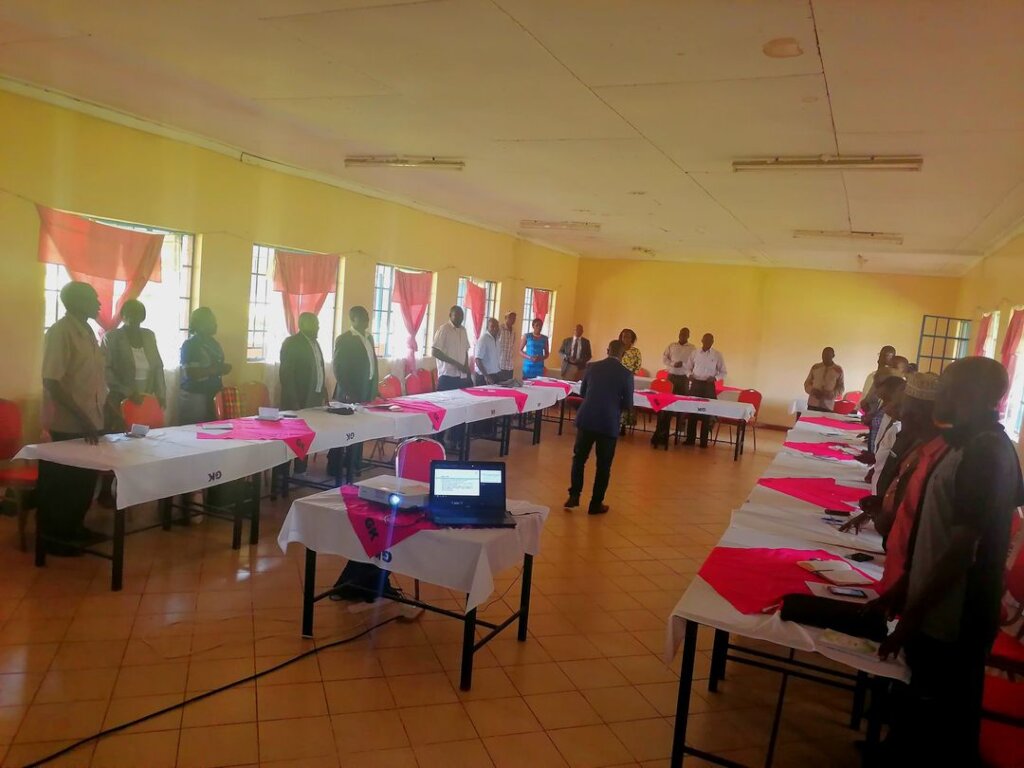By Edwin Ngongesa | Project Officer
The activities took place at Kakamega Multipurpose Centre. Introductions were done by participants. The organization did a brief presentation of its objectives and what it implements in the community. The participants were taken through the WASH project and trained on their roles under the Kenya Water Sanitation and Hygiene (WASH) legislation, policy, and guidelines for primary schools. The purpose was to enable them to be their own advocates when it comes to all matters WASH.
During this meeting, WE REACH met 90 members from 30 primary Schools that WE REACH included in the second phase of the WASH project in Lurambi Sub County. The head teachers and the BOM members were taken through their roles in schools in promoting Water Sanitation and Hygiene (WASH) and as well advocate for WASH matters in their schools. These included; promoting and demonstrating regular hand washing and positive hygiene behaviors and monitoring their uptake. To ensure adequate water supply in the school to meet the demand, clean and separate toilets for girls and boys, ensure soap and safe water is available at each-appropriate hand washing station and encourage frequent and thorough washing (at least 20 seconds).
Cleaning school buildings/infrastructures, classrooms especially water and sanitation facilities at least once a day, particularly surfaces that are touched by many people (railings, lunch tables, sports equipment, door and window handles, toys, teaching, and learning aids.
The provision of toilet papers to the pupils was much emphasized. This is because it will prevent the spread of diarrhoeal diseases and worm infestation in the school. It was demonstrated how the bacteria spread from one person to another if the pupil doesn’t have a toilet paper to wipe him/herself. The Board of Management (BOM) members and the head teachers were also urged to provide a room for menstrual hygiene management for the girls. Most of the schools present didn’t have the MHM facilities for the girls. They were advised to convert one or two toilets into bathing rooms and avail water and soap that is for the schools that have more than enough toilets.
For WASH in Schools programs to be sustainable and successful it requires the involvement and buy-in of all the stakeholders in the school setting. Headteachers and BOM members can be role models in schools for the pupils. They can be champions in WASH matters in advocating for required hygiene standards. The school administration can also be integral in working with local governments such as the Ministry of Health and education to ensure schools are adhering to all required WASH standards and protocols.
The participants were taken through an evaluation form for the WASH project that was filled by the head teachers of the schools that were present. It was a three-star score card where one star is bronze, two-star silver, and three-star represents gold. The head teachers were to confirm the scores because they would be used to rank them in this project. The evaluation was according to the infrastructures they have. That is Water Sanitation and Hygiene facilities in their schools.
Lastly, the participants were trained on how to fundraise in order to accomplish some of these projects like; drilling boreholes, constructing latrines/toilets, and washing rooms for girls among others. Illustrations were done to the participants and steps to be followed when writing a proposal to a potential donor for funding their project. WE REACH assured them if they write a good proposal definitely they will get funding and offered to assist any of the participants to write a proposal if it was available. Other ways of fundraising were mentioned like organizing sports events like football tournaments, marathons, and the school alumina.
3.0: LESSONS LEARNT
4.0 CHALLENGES AND RESOLUTIONS
Minimal support from the National and County government when it comes to construction
5.0: RECOMMENDATIONS AND REQUIRED ACTIONS.
Project reports on GlobalGiving are posted directly to globalgiving.org by Project Leaders as they are completed, generally every 3-4 months. To protect the integrity of these documents, GlobalGiving does not alter them; therefore you may find some language or formatting issues.
If you donate to this project or have donated to this project, you can receive an email when this project posts a report. You can also subscribe for reports without donating.
Support this important cause by creating a personalized fundraising page.
Start a Fundraiser